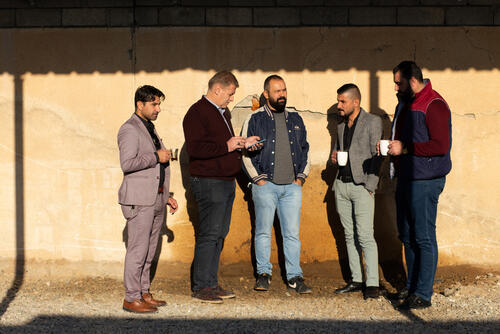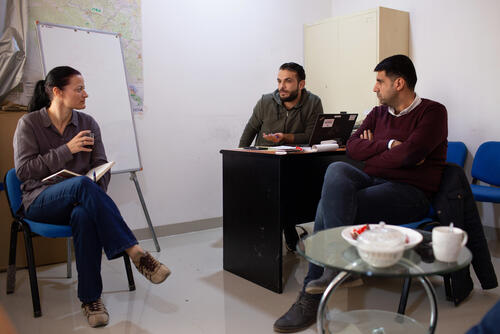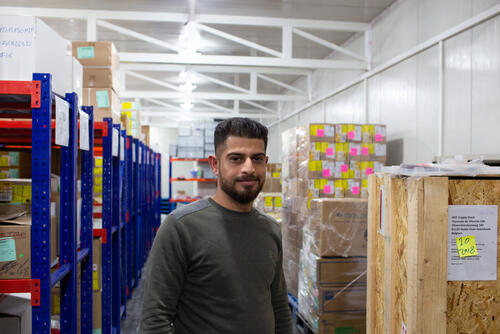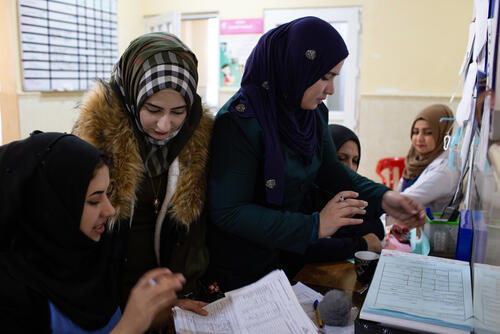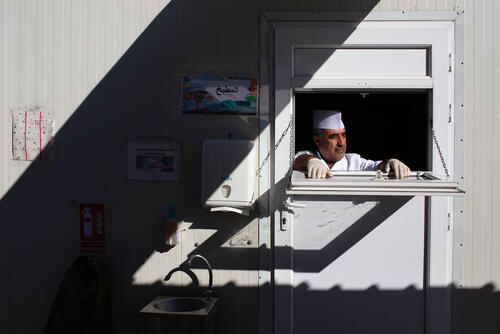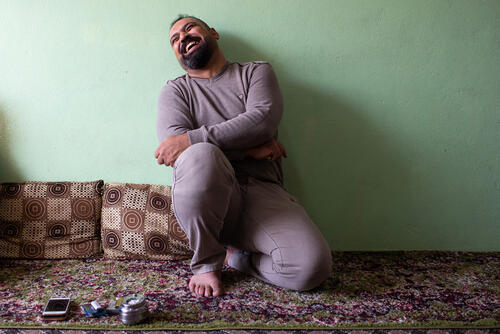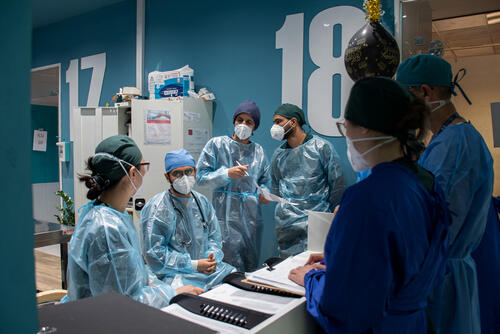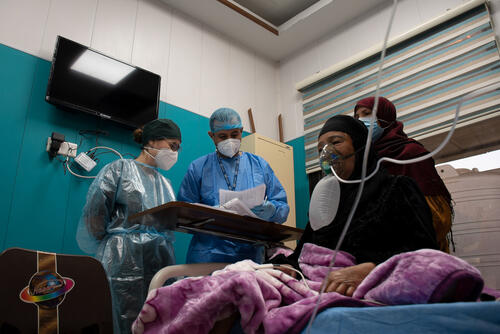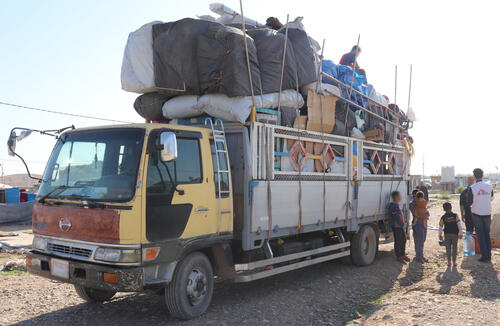When Suhaib Majed heard of an organisation looking to hire people in Hammam Al-Alil, northern Iraq, back in 2017, he headed directly to the souk where applications were being received.
Maybe he was trying to restore an aspect of life that had come to a halt in Mosul throughout the previous three years. He wasn’t very optimistic; he thought he wouldn’t get a position if he had nobody to support him in the recruitment process. Besides, his resumé was practically empty. But he had nothing to lose and still decided to try.
“When I applied to work with Médecins Sans Frontières, I was just looking for a job like any other unemployed person,” says Suhaib. “I also thought from the name of the organisation that they only hired doctors.”
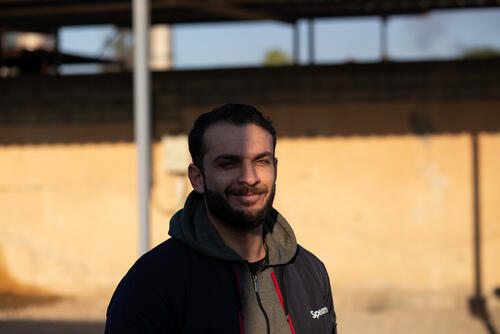
Hiring more than just doctors
He then realised that there were job openings for translators, pharmacists, and logisticians. Soon, he was hired as a translator after passing the exam and interview.
Recent protests in Iraq have shown that it is not easy for Iraqis, especially youth, to find jobs. In Mosul, like in other cities across the country, job opportunities are particularly limited.
During the 2017 military operations to retake the city, various international organisations came in to assist people. And despite the tragedy of the ongoing battles, hundreds of people in and around Mosul got an unexpected chance at a new type of job.
Médecins Sans Frontières (MSF) is one of the many non-governmental organisations (NGOs) that responded to the great humanitarian needs in the area. But despite the rather self-explanatory name – it translates from French as ‘Doctors Without Borders’ – the work of the medical organisation cannot be accomplished without the efforts of its non-medical staff, working ‘behind the scenes’. At MSF, the roles of medical and non-medical staff are equally important in delivering healthcare to people.
Suhaib has now worked with MSF in four different positions, none of them medical. His current position is based in the comprehensive post-operative care centre in East Mosul. As field coordinator support, he represents MSF with the local authorities. He keeps himself well informed about the developments in the area, and his passion for writing helps him to draft regular reports which contribute to the continuity of activities in the project.
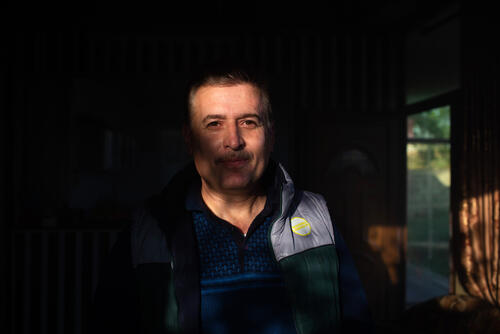
Local people the lifeblood of MSF work
Many people also generally imagine the work of international NGOs like MSF, in Iraq and throughout the region, being done by foreigners, which sometimes raises suspicion. Suhaib’s colleague Yasmine Mohammed, who works as a watchwoman in the centre, explains that the acceptance of humanitarian organisations was not very high when they started working in Mosul after the battle to retake the city from Islamic State group.
“It wasn’t very favourable for Iraqis to work with organisations at first. The community did not welcome the idea of us working with foreigners, considering the events Iraq has witnessed for more than a decade,” Yasmine says. “But the perception changed when these organisations started providing much needed services; Mosul wouldn’t have started recovering if it wasn’t for that.”
Over time, people coming in for services could also witness that, just like Yasmine or Suhaib, most of the organisation’s employees were actually Iraqis.
In fact, Iraqis make up for more than 90 per cent of the 1,700 people who work for MSF in Iraq. Their roles are diverse, from driver to doctor, from cleaner to biomedical technician, from pharmacist to supply officer, and many more.
Yet each person’s role is considered vital for the functioning of the project. Everyone works very hard to accomplish their tasks, and these efforts form a butterfly effect that has a great impact when it comes to the bigger picture. Without the Iraqi staff, MSF’s activities wouldn’t come to life and stay alive.
For Yasmine, the contribution consists in searching female staff, patients, and visitors before they enter the facility, for the security of all. When doing so, she generally also asks them how they’re doing and welcomes them with great warmth. She loves her job because it gives her a chance to boost people’s morale, people who might be looking for positive energy every now and then.
Pride in helping local communities
Across the Tigris river, in West Mosul, dedicated Iraqi staff are also working to make MSF’s activities in Nablus hospital possible. Abdallah Zarzour sees a huge added value in his role as head of cooks and executes it with dedication.
“A watchman protects the hospital from potential external dangers, while I need to protect patients from internal threats,” says Abdallah. “Preparing food for people is a great responsibility; we abide by the highest safety and hygiene standards when making the meals for patients and their caretakers.”
He has suffered great losses in his life, but he always manages to give back and make people happy. When asked how he’s doing, he always replies with lines of poetry, reflecting both his intellect and love for life in its bittersweet nature.
His colleague Nour Al-Zouhairy, who is a medical data supervisor, has been working in Nablus hospital for about two years. She also believes she’s indirectly helping her community.
“Collecting medical data means identifying the health issues people suffer from, which helps us adapt our activities based on the needs,” says Nour. “This makes me feel that my role in passing on information on people’s suffering is very important, even if I’m not directly part of the medical team.”
My role in passing on information on people’s suffering is very important, even if I’m not directly part of the medical team.Nour Al-Zouhairy, medical data supervisor
It means a great deal for Nour to be helping people one way or another. She’s happy to contribute in helping her city, Mosul, like her parents who work in the public health sector do.
All our staff originating and working in Mosul have stories of resilience and perseverance to tell, stories that give another dimension to the life of the city. Suhaib, Yasmine, Abdallah, and Nour are four of many non-medical Iraqi staff who deserve credit and appreciation.
When humanitarian action is put forward, they are usually not the ones represented. Yet, their role is essential and what makes the assistance to the people of Mosul possible. Like many other humanitarian workers in Iraq and beyond, they all insist on helping their community and believe they can accomplish that through their daily tasks. They all move forward, in hopes of a better tomorrow.



